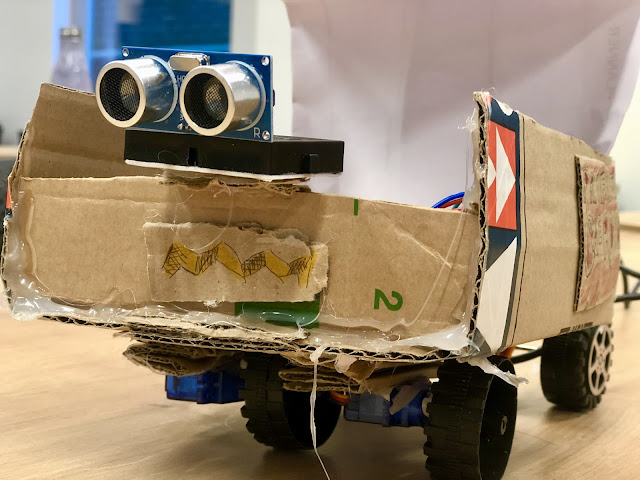 |
| My team, classmates, our Lecturer P.J. Blount, me and our brand new Arduino robots |
Code, Robotics, and the Law: The Robotics Challenge Competition at the Law and Tech Workshop!
By Ysa Vieira
Recently, I had the pleasure of participating in an engaging Law and Technology Workshop organised as an extracurricular activity in conjunction with the Law, Technology, and Society module of my LLB programme at Cardiff University. This two-day intensive event explored the intersection of technological innovation, legal frameworks, and the practicalities of robotics. Alongside the academic exploration, the workshop culminated with a fascinating robotics competition for the students– and to our delight, our team emerged victorious!
The workshop commenced with a warm welcome, followed by a hands-on introduction to the Arduino platform.
Arduino is an Italian open-source (hardware and software) electronics platform. Arduino boards are capable of reading inputs, such as a light from a sensor, a finger pressing a button, or a tweet, and translating them into outputs, such as starting a motor, turning on an LED, or posting content to the internet. By delivering a set of instructions to the microcontroller on the board, you can instruct your board on what to do. You use the Arduino Software (IDE), based on Processing, and the Arduino programming language, which is based on Wiring, to accomplish this. Arduino has been the brains behind thousands of projects over the years, ranging from simple household items to sophisticated scientific equipment.
 |
| P J Blount, Ben Turner - Cardiff University |
In the workshop students learned the fundamentals of coding, starting with the classic "Hello World!" program that makes an LED blink. This initial exercise provided a solid foundation for the more complex robot programming task we have ahead.
Next, students had a thought-provoking discussion centred around Lawrence Lessig's concept of "code as law." This session explored how the very architecture of technology shapes user behaviour and regulation, highlighting the interplay between legal frameworks and technological advancements.
In the next session, participants were introduced to the fascinating world of basic robotics. We eagerly built and coded our own robots, each controlled by the Arduino we'd previously become familiar with. With our creations taking shape, the excitement for the upcoming challenge was growing.
Following a well-deserved pizza break, we had a session with interesting discussions on intellectual property, specifically copyright and patents, within the context of computer code and the ethical boundaries that surround it. We talked about the open-source technology movement, exploring the available licenses and the critical "right to repair" issue.
Empowered by the excitement of the robotic challenge the second day began with a morning dedicated to "Hacking the Bot." We were presented with the official rules for the robotics challenge and unleashed to design and modify our robots in preparation for the competition. Needless to say, this session triggered the student's creativity and problem-solving skills to work around the code that could give instructions to our robots.
 |
| The rules of the robotic challenge |
The robotics challenge! it's all about teamwork!
After the pizza break, the moment of truth arrived – the Robotics Challenge! Each team's robot, guided by its designated "solicitor," competed to deliver a mock "motion" (represented by an A4 sheet of paper) to the designated "court" at the opposite end of the obstacle-laden course. The atmosphere was full of tension and excitement.
I’m happy to say that our team's robot emerged triumphant as the winner! successfully delivering the "motion".
 |
| How cute is our robot! |
But beyond the thrill of the competition, the true value of the "Code, Robotics, and Law" workshop resided in its ability to blend legal debates with practical robotics skills. It opened our eyes to the complex interplay between innovation and regulation, while simultaneously allowing us as law students to develop new coding skills and enjoy a different weekend in a completely different environment from our usual law school lectures.
I can certainly speak for my peers by saying that it was a great experience for all of us to have the opportunity to participate in this activity.
We want to give a huge thank you to our amazing Cardiff University Lecturers from the module Law and Tech, P. J. Blount and Ben Turner, for organising this fantastic workshop. Their dedication to creating an engaging learning environment that blended legal theory with practical application was a fantastic experience for us.





